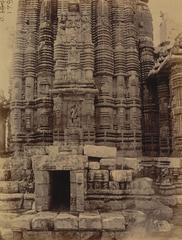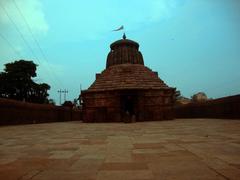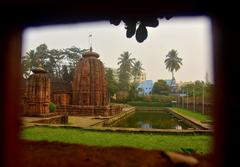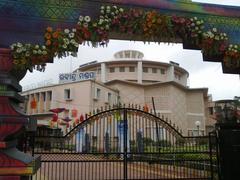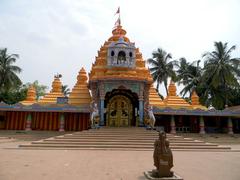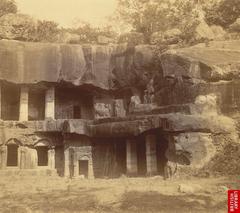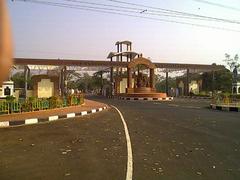Brahma Temple Visiting Hours, Tickets, and Historical Significance in Bhubaneswar
Date: 04/07/2025
Introduction: Discovering the Unique Brahma Temple
Located in the spiritual heart of Bhubaneswar, Odisha—the “Temple City of India”—the Brahma Temple at Bindusagar Lake stands as a rare monument to Lord Brahma, the creator in the Hindu trinity. While most temples in Bhubaneswar honor Lord Shiva, the Brahma Temple’s distinct dedication, impressive Kalinga architecture, and enduring mythological connections make it a captivating destination for pilgrims, heritage travelers, and architectural enthusiasts. Built between the 9th and 15th centuries CE, the temple forms an essential part of the sacred landscape surrounding Bindusagar Lake, believed to have been created by Lord Shiva from the drops of sacred rivers. Visitors are drawn by the temple’s detailed stone carvings, the symbolic four-faced Brahma idol, and the vibrant festivals such as Ashokashtami and Chandan Yatra that highlight its living spiritual traditions. Accessible by boat or on foot from Bhubaneswar’s Old Town, the Brahma Temple offers a tranquil yet culturally rich retreat. This comprehensive guide details visiting hours, tickets, access, architectural highlights, cultural significance, and travel tips to ensure an enriching visit (discoverbbsr.com; Odisha Tourism; TravelTriangle).
Table of Contents
- Introduction
- Historical Origins and Setting
- Sacred Geography: Bindusagar Lake
- Architectural and Religious Context
- Role within Bhubaneswar’s Temple Complex
- Architectural Features and Conservation
- Visiting Hours, Tickets, and Access
- Travel Tips and Accessibility
- Nearby Attractions
- Festivals and Special Events
- Visuals and Media
- FAQs
- Religious and Cultural Significance
- Interfaith and Educational Dimensions
- Visitor Recommendations
- References
Historical Origins and Setting
The Brahma Temple is a rare jewel amidst Bhubaneswar’s famed temple landscape, which flourished from the 7th to 12th centuries CE during the Kalinga architectural renaissance (discoverbbsr.com). Located in the historic Old Town near Bindusagar Lake, it belongs to the spiritual core of the city, emphasizing Bhubaneswar’s status as a center of religious and architectural innovation.
Sacred Geography: The Myth of Bindusagar Lake
Bindusagar Lake holds immense religious significance. According to Hindu legend, Lord Shiva created the lake by gathering drops from every sacred river in India to quench Goddess Parvati’s thirst, imbuing the water and its island shrines—including the Brahma Temple—with special sanctity (discoverwalks.com).
Architectural and Religious Context
Unique Dedication
Unlike most Bhubaneswar temples dedicated to Shiva, the Brahma Temple is one of India’s few shrines devoted to Lord Brahma, enhancing its spiritual allure (Odisha Tourism).
Architecture
Constructed between the 9th and 12th centuries CE—likely under the Somavamsi or Ganga dynasties—the temple is a fine example of the Kalinga style, with a curvilinear rekha deul spire, square sanctum, and intricate stone carvings. Its iconic four-faced Brahma idol symbolizes the four Vedas and the creative principle of Hindu cosmology (discoverbbsr.com).
Location
Situated on an island within Bindusagar Lake, the temple’s boat-only access adds to its aura of exclusivity and reverence.
Role within Bhubaneswar’s Temple Complex
The Brahma Temple’s proximity to the massive Lingaraja Temple underscores its ritual importance. During major festivals such as Chandan Yatra, deities are ceremonially brought to Bindusagar Lake, with the Brahma Temple playing a central role in the festivities (tusktravel.com).
Architectural Features and Conservation
Though smaller than Lingaraja Temple, the Brahma Temple features hallmark Kalinga elements—locally sourced sandstone, curvilinear spire, and detailed carvings depicting mythological and daily life scenes. The temple’s island location has helped preserve it from urban encroachment, though the elements pose conservation challenges. The Archaeological Survey of India and local bodies regularly conduct restoration to maintain structural integrity (ASI Bhubaneswar Circle).
Visiting Hours, Tickets, and Access
- Visiting Hours: Typically open daily from 6:00 AM to 8:00 PM; some sources note hours from 5:00 AM to 9:00 PM. Festival periods may affect timings.
- Entry Fee: Free for all visitors.
- Access: Reachable by boat from Bindusagar Lake ghats, with frequent services during the day. Some approaches may allow access by foot, depending on water levels.
- Best Time to Visit: Early mornings or late afternoons for peaceful visits; festivals for immersive cultural experiences.
Travel Tips and Accessibility
- Getting There: The temple is in Old Town, Bhubaneswar, accessible by taxi, auto-rickshaw, or local buses from the city center, railway station, or airport.
- Amenities: Basic restrooms and small eateries are found near the lake embankments.
- Accessibility: Boat access and steps can pose challenges for differently-abled visitors. Assistance is available but infrastructure is limited.
- Dress Code: Modest attire is required; shoes must be removed before entering the complex.
- Photography: Permitted outside and generally inside, but avoid using flash and respect ongoing rituals.
Nearby Attractions
- Lingaraj Temple: Bhubaneswar’s largest and most revered Shiva temple.
- Mukteshwar Temple: Renowned for its intricate architecture.
- Rajarani Temple: Famous for its sculptural beauty.
- Bindusagar Lake: The spiritual heart of Old Town, central to local festivals.
- Odisha State Museum: For insights into regional art and history (TravelTriangle).
Festivals and Special Events
- Chandan Yatra: A 42-day festival when deities of Lingaraj Temple visit the Brahma Temple by boat, drawing crowds for elaborate rituals (Hindu Blog).
- Rukuna Ratha Jatra: Annual chariot festival where Lord Brahma is symbolically present as Lord Lingaraj’s charioteer.
- Ashokashtami: Another major festival with processional rituals linking the temple to the larger sacred landscape (The Hindu, 2023).
Visuals and Media
- Image suggestions: “Brahma Temple Bhubaneswar with four-faced Lord Brahma idol”, “Bindusagar Lake and Brahma Temple during Ashokashtami festival”.
- Alt text: Use descriptive tags for accessibility and searchability.
- Interactive Map: Embed a map showing the temple’s location and nearby attractions.
Frequently Asked Questions (FAQ)
Q: What are the Brahma Temple visiting hours?
A: Typically from 6:00 AM to 8:00 PM (some sources say 5:00 AM to 9:00 PM); check during festivals.
Q: Is there an entry fee?
A: No, the temple is free to visit.
Q: How do I reach the temple?
A: By boat from Bindusagar Lake ghats, or by foot from Old Town if water levels permit.
Q: Are guided tours available?
A: Yes, local guides can be arranged near Lingaraj Temple or Bindusagar Lake.
Q: Is the temple accessible for differently-abled visitors?
A: Accessibility is limited due to boat access and steps; assistance is recommended.
Q: Can I take photographs?
A: Photography is generally allowed, but please be discreet and avoid flash during rituals.
Religious and Cultural Significance
Unique Dedication and Symbolism
The Brahma Temple is one of India’s very few active Brahma shrines, making it a site of great religious and scholarly interest (Odisha Tourism). The four-faced Brahma idol symbolizes the four Vedas and the creative energy of the universe.
Mythological and Ritual Connections
Local legend recounts that Lord Brahma performed a yajna at Bindusagar Lake to consecrate the land for Shiva’s abode, linking the temple to the mythic origins of Bhubaneswar (Orissa Review, 2017). The temple, while modest in daily worship, becomes a focal point during festivals—particularly Ashokashtami, when ritual processions and ceremonial baths take place.
Integration into Bhubaneswar’s Heritage
The Brahma Temple exemplifies the modest scale and aesthetic of early Kalinga architecture (Indian Heritage). Its location on the lake’s embankment illustrates the Hindu association of water with creation and purity.
Interfaith and Educational Dimensions
The temple’s proximity to other major shrines fosters a climate of inclusive worship and religious pluralism (Incredible India). Educational tours and heritage walks are common, offering historical context and promoting community engagement (Odisha Tourism).
Visitor Recommendations
- Visit early morning or late afternoon for tranquility and the best light.
- Attend major festivals like Chandan Yatra or Ashokashtami for immersive experiences.
- Hire a local guide for deeper insights.
- Dress respectfully and be mindful of photography rules.
- Support conservation efforts through donations or participation in community events.
References and Further Information
- Discover BBSR - Brahma Temple
- Odisha Tourism - Brahma Temple
- Tusk Travel - Lingaraja Temple Guide
- TravelTriangle - Temples in Bhubaneswar
- Orissa Review, 2017
- The Hindu - Ashokashtami Festival
- ASI Bhubaneswar Circle
- Incredible India - Brahma Temple
- Hindu Blog - Brahma Temple
- Orissa Guide - Brahma Temple Bindusagar
All factual information is current as of July 2025 and based on the latest available sources.
